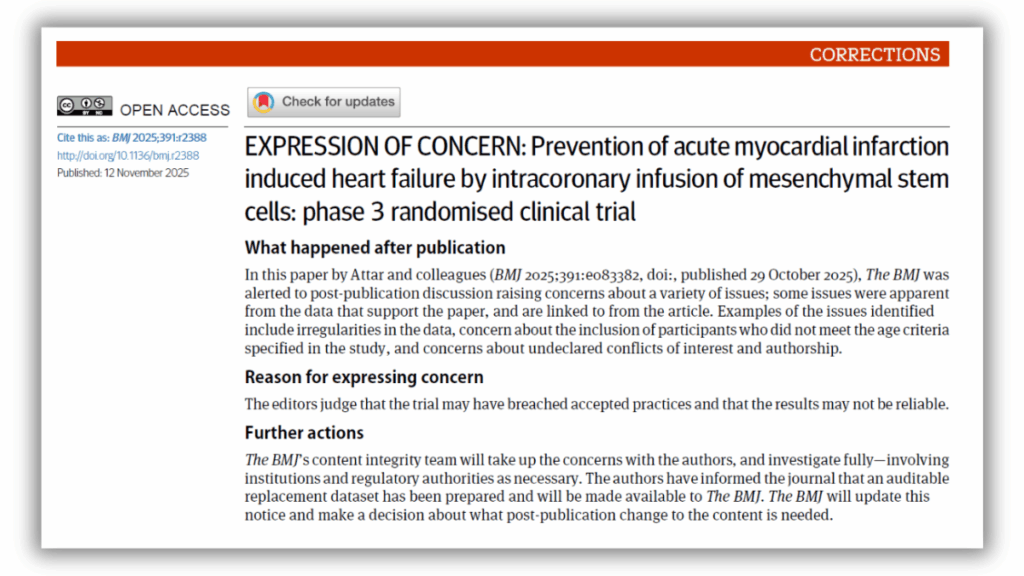The BMJ has issued an expression of concern for a paper claiming stem cell therapy can reduce the risk of heart failure. The move comes after sleuths and scientists critiqued the “complete mismatch” between the study data and the article itself.
As we reported last week, the October 29 paper included results of a phase III clinical trial in Shiraz, Iran. Critics quickly began pointing out discrepancies in the data on PubPeer, including psychologist Nick Brown, who pointed out a “curious repeating pattern of records in the dataset” every 101 records.
According to the expression of concern published today, The BMJ acknowledged issues “apparent from the data that support the paper” including data irregularities, discrepancies in the age criteria and the ages of participants included in the study, and undeclared conflicts of interest.
Dorothy Bishop, professor of developmental neuropsychology at Oxford University, was the first to point out issues with the paper, specifically that the study claimed to have enrolled only patients under 65 years of age. However, in the accompanying data, 127 of the patients were older than 65 — a “complete mismatch,” she told us. She also noted the authors made the data available to the journal and reviewers only after the paper had undergone two rounds of peer review.
On PubPeer, Bishop pointed out potential conflicts of interest, noting author Anthony Mathur, a researcher at Queen Mary University of London, is a shareholder and trustee of the Heart Cells Foundation, a charity that funds a unit for administering stem cell therapies to cardiac patients.
“The editors judge that the trial may have breached accepted practices and that the results may not be reliable,” the notice states. The BMJ plans to investigate fully, the notice continues, and will consider an “auditable replacement dataset” the authors provided to the journal. Most of the authors, including corresponding author Armin Attar, are researchers at Shiraz University of Medical Sciences.
After our article was published, sleuths continued to point out issues with the paper. Gideon Meyerowitz-Katz, a research fellow at the University of Wollongong in Australia, noted “oddities” in the data, including that nearly half of recorded heart rates were divisible by five. He also pointed out an “unexpected” pattern in patient’s temperatures — of 311 recorded temperatures, 42 were exactly 36.2 degrees Celsius.
Retractions in The BMJ are rare. The journal issued its first retraction in 1989 and has retracted a total of just 12 articles, according to the Retraction Watch Database.
Like Retraction Watch? You can make a tax-deductible contribution to support our work, follow us on X or Bluesky, like us on Facebook, follow us on LinkedIn, add us to your RSS reader, or subscribe to our daily digest. If you find a retraction that’s not in our database, you can let us know here. For comments or feedback, email us at [email protected].

Always a COI somewhere…
BMJ level strongly dropped in the last years….